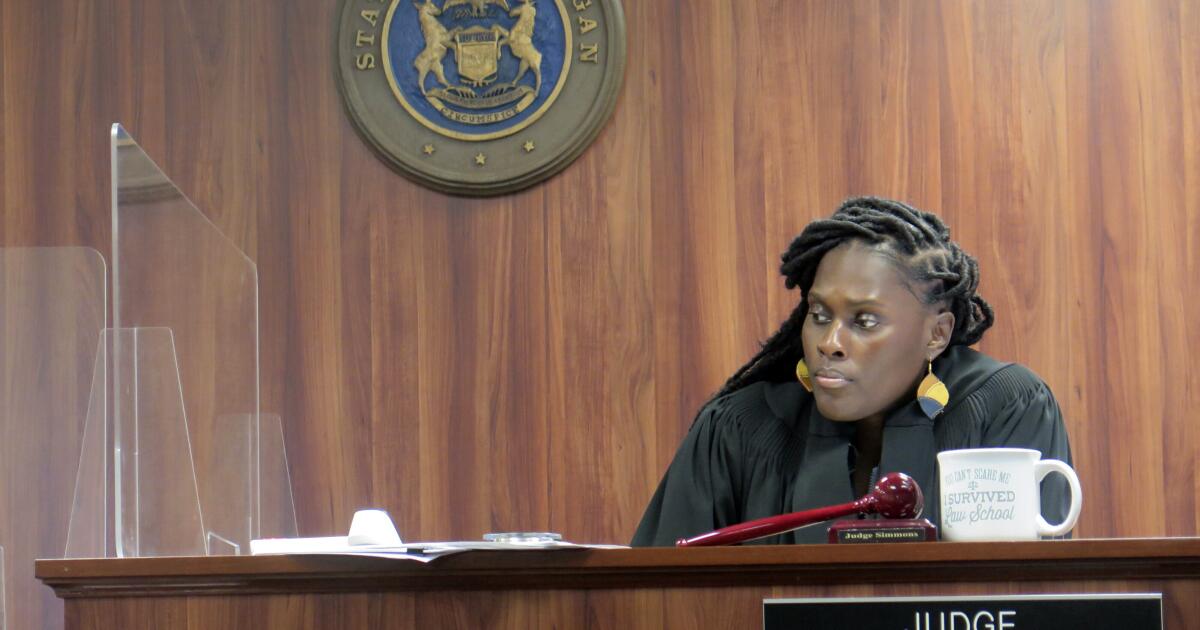Michigan judge tosses case against 15 accused fake electors for President Trump in 2020
LANSING, Mich. — A Michigan judge dismissed criminal charges Tuesday against a group of people who were accused of attempting to falsely certifying President Trump as the winner of the 2020 election in the battleground state, a major blow to prosecutors as similar cases in four other states have been muddied with setbacks.
District Court Judge Kristen D. Simmons said in a court hearing that the 15 Republicans accused will not face trial. The case has dragged through the courts since Michigan Atty. Gen. Dana Nessel, a Democrat, announced the charges over two years ago.
Simmons said she saw no intent to commit fraud in the defendants’ actions. Whether they were “right, wrong or indifferent,” they “seriously believed” there were problems with the election, the judge said.
“I believe they were executing their constitutional right to seek redress,” Simmons said.
Each member of the group, which included a few high profile members of the Republican Party in Michigan, faced eight charges of forgery and conspiracy to commit election forgery. The top felony charges carried a maximum penalty of 14 years in prison.
Supporters, friends and family crowded in the hallway outside the courtroom cheered when the judge said the cases would be dismissed. Defendants leaving the courtroom cried and hugged friends and family. One woman wept as she hugged another and said, “We did it.”
Investigators said the group met at the Michigan GOP headquarters in December of 2020 and signed a document falsely stating they were the state’s “duly elected and qualified electors.” President Joe Biden won Michigan by nearly 155,000 votes, a result confirmed by a GOP-led state Senate investigation in 2021.
Electors are part of the 538-member Electoral College that officially elects the president of the United States. In 48 states, electors vote for the candidate who won the popular vote. In Nebraska and Maine, elector votes are awarded based on congressional district and statewide results.
One man accused in the Michigan case had the charges against him dropped after he agreed to cooperate with the state attorney general’s office in October 2023. The other 15 defendants pleaded not guilty and have maintained that their actions were not illegal.
Judge Simmons took nearly a year to say whether there was sufficient evidence to bring the cases to trial following a series of lengthy preliminary hearings.
Prosecutors in Nevada, Georgia, Wisconsin and Arizona have also filed criminal charges related to the fake electors scheme. None of the cases have neared the trial stage and many have been bogged down by procedural and appellate delays.
In Nevada, the state attorney general revived a case against a group of allegedly fake electors last year, while a judge in Arizona ordered a similar case back to a grand jury in May. In Wisconsin last month, a judge declined to dismiss felony charges against three Trump allies connected to a plan to falsely cast electoral ballots for Trump even though Biden won the state in 2020.
The Georgia prosecution is essentially on hold while Fulton County District Attorney Fani Willis in Atlanta, who brought the charges against President Trump and others appeals her removal from the case. Technically, Trump is still a defendant in the case, but as the sitting president, it is highly unlikely that any prosecution against him could proceed while he’s in office.
The effort to secure fake electors was central to the federal indictment against Trump that was abandoned earlier this year shortly before Trump took office for his second term.
Volmert writes for the Associated Press.

